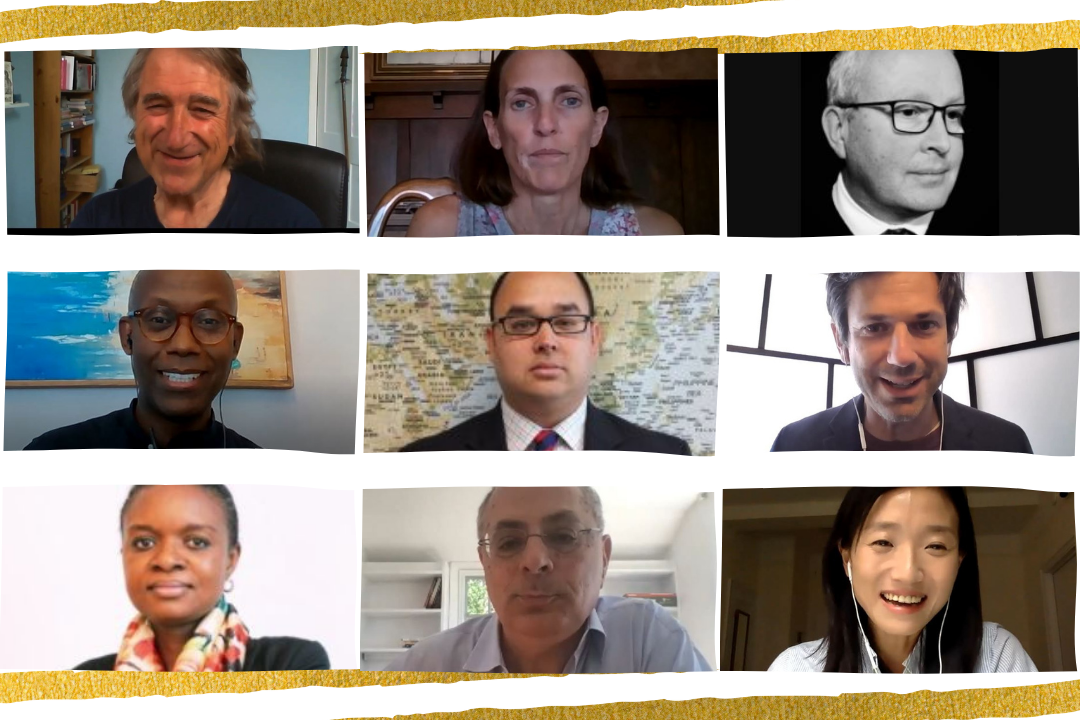Guest speakers included (pictured from left to right): (Top Row) David Hall, Board Member of We Own It; Veronique de Rugy, Senior Research Fellow at the George Mason University Mercatus Center; David Baxter, Senior Advisor to the International Sustainable Resilience Center for PPPs; (Middle Row) Thomas Debass, Managing Director of the Office of Global Partnerships at the U.S. Department of State; Michael Maduell, President, Co-founder and Chairman of the Sovereign Wealth Fund Institute; Patrick Heller, Advisor at the Natural Resource Governance Institute; (Bottom Row) Fatouma Toure Ibrahima, Practice Manager of the PPP Group for the World Bank's Infrastructure Finance, PPPs and Guarantees Department; Dr. Adnan Mazarei, Nonresident Senior Fellow at the Peterson Institute for International Economics; and Dr. Zongyuan Zoe Liu, Assistant Professor at Texas A&M’s Bush School of Government and Public Service in Washington, DC.
The latest Global & Experiential Education (G&EE) Business & Society Series course, "Privatization, Nationalization, and Public-Private Partnerships," was taught this past summer by Robert Weiner, professor of international business, international affairs, and public policy and public administration at the George Washington University School of Business.
G&EE Business & Society Series courses examine the broad societal arena in which businesses operate, giving particular focus to political, economic and cultural environments. Professor Weiner’s offering was especially timely, as the COVID-19 pandemic has led to a resurgence of government in business around the world, in industries from airlines to petroleum. The class utilized an international political-economy framework to investigate the state’s role in industry and markets, spotlighting interactions between public and private sectors.
Reflecting on the experiential nature of the course, Professor Weiner asserted, “GWSB experiential education courses provide students opportunities to apply their classroom learning to current issues facing business and society. Infrastructure revitalization is a great example of one such issue, bringing together investment and Public-Private Partnerships (PPPs). Especially with infrastructure at the top of the US national political agenda, it was exciting to hear from experts on PPP from the private sector, US Department of State, and World Bank.” Along with guest speakers, students learned through focused group projects, which explored course-related themes, including media privatization in India, public vs. private prisons in the USA, PPPs in European transport infrastructure, and Boeing as a defense contractor.
By featuring a global cache of experts, this course offered rich cross-analysis of policy processes aimed at determining whether privatization and public-private partnerships improve the financial and operating performance of formerly state-owned enterprises. Professor Weiner reflected on the value of such guest speakers, stating “The great thing about this offering is that it goes beyond a US-centric view of the world to learn from the experience of many nations with the state playing a central role in business. Our diverse speaker group allowed us to go beyond the traditional view that government ‘steers’ the economy while firms ‘row,’ to one where government and business are both rowers. An advantage of our DC location is that GWSB can view both business and government as ‘we’ rather than ‘we’ and ‘they.’ Many of our students are not aware that this model is prevalent around the world. A goal is to provide a broad global perspective on challenges facing business at home."


